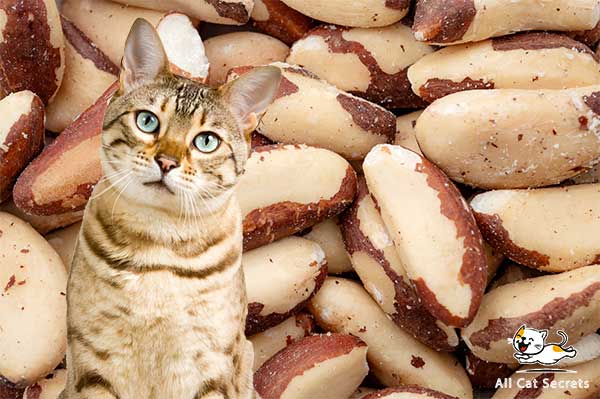Nuts are loaded with protein, fiber, fats, and a host of other essential nutrients. That might explain why most nuts are considered superfoods for humans. But can the same be said about cats? Can cats eat nuts?
Most nuts are non-toxic to cats. These foods are unlikely to trigger immediate medical emergencies. However, all nuts are not made equal. That’s especially if viewed in terms of their safety for cats. While some nuts do not pose immediate health risks to cats, others could prove disastrous even if only consumed in small amounts.
And that brings us back to the question, can cats eat Brazil nuts?
Like most nuts, Brazil nuts pack essential minerals, many of which your feline companion can benefit from. These nuts are also non-toxic to cats. That makes them safe for cats to eat. But as you shall find, Brazil nuts are considerably high in fat. These nuts may induce weight gain and many other weight-related conditions, especially if consumed excessively. So, while cats can eat Brazil nuts, they should only do so occasionally and in moderation.
Perhaps you’ve always wondered, ‘can cats have brazil nuts?’
It’s okay for cats to have Brazil nuts but only as an occasional treat. Brazil nuts (and any other nut for that matter) should never replace your cat’s regular diet.
Read on as we delve deeper into the potential benefits and risks of Brazil nuts for cats.
Table of Contents
Are Brazil Nuts Safe for Cats?
We’ve just pointed out that Brazil nuts do not pose any immediate health risks to cats. So, these nuts can be described as safe for nuts.
However, it’s important to note that cats are obligate carnivores. Their diets consist primarily of animal protein.
Evolution has not prepared a cat’s stomach for plant-based foods. Therefore, the mere fact that Brazil nuts are inherently plant-based products means these nuts could cause digestive issues for cats. That’s particularly if consumed in excess.
The only saving grace is that cats actually do consume plants from time to time. You must have caught your feline friend nibbling on grass blades or mint leaves in your backyard on several occasions.
Plants help to relieve indigestion as well as clear hairballs from a cat’s stomach. Even so, they should only be consumed in moderation.
If you’ve never shared Brazil nuts with your cat before, you’d do well to consult your vet first. Alternatively, ensure you keep the portions as low as possible.
- Natural prebiotic fiber, sourced from chicory root, helps promote digestive health
- High protein formula with real chicken as the first ingredient
- Fortified with live probiotics to support digestive and immune health
Last update on 2024-09-30 / Affiliate links / Images from Amazon Product Advertising API
Do Brazil Nuts Have Any Health Benefits For Cats?
A one-ounce serving (about 28 grams) of Brazil nuts has the following nutritional profile;
- Calories – 187
- Protein – 4.1 grams
- Fat – 19 grams
- Carbs – 3.3 grams
- Fiber – 2.1 grams
- Vitamin E – 11% of THE Recommended Daily Intake (RDI)
- Selenium – 988% of the RDI
- Magnesium – 33% of the RDI
- Phosphorus – 30% of the RDI
- Manganese – 17% of the RDI
- Thiamine – 16% of the RDI
- Zinc – 10.5% of the RDI
NOTE: The RDI values are based on humans, not cats. That said, most of the nutrients in Brazil nuts may also be beneficial for cats.
For instance, Brazil nuts are rich in dietary fiber. Fiber is noted for its role in aiding digestion.
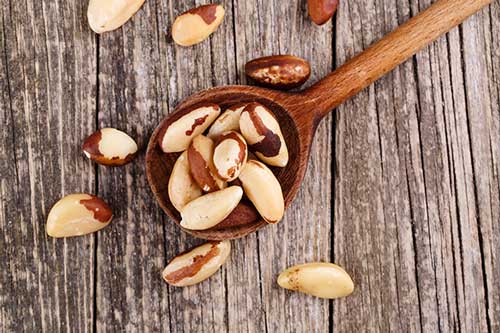
Dietary fiber falls into two main groups, namely soluble and insoluble fiber.
Soluble fiber supports digestion by nourishing the gut-friendly microorganisms that live throughout your cat’s alimentary canal.
On the other hand, insoluble fiber moves through a cat’s stomach undigested. Instead, it bulks up the animal’s stool. That can help to relieve constipation while also maintaining the cat’s bowel activity.
Insoluble fiber is also famous for creating a filling effect. Incorporating fiber-rich foods like Brazil nuts into your cat’s diet is a creative way to control the food portions that the animal can consume in one sitting. That might go a long way in keeping your cat’s weight in check.
The following are other possible health benefits of Brazil nuts for cats, based on the various nutritional elements in these nuts;
1. Increasing Muscle Mass
Cats require more protein in their diets than any other nutrient. While your adorable furball can derive his nutritional requirements entirely from animal products, it doesn’t hurt to supplement his diet with protein-rich plant-based foods like Brazil nuts.
Protein plays several crucial roles in the body. Most notably, it helps increase muscle mass by acting as the building block for muscles, tissues, and organs.
2. Supporting Thyroid Functions
The thyroid gland secretes several hormones that are useful for normal growth and development. These hormones also affect an animal’s metabolism and body temperature regulation.
Selenium plays a huge role in enhancing the functionality of the thyroid gland. Fortunately, Brazil nuts are loaded with this mineral.
Therefore, feeding Brazil nuts to your cat occasionally might help to lower the incidences of thyroid-related complications like thyroiditis and hypothyroidism.

3. Reducing Risks of Chronic Diseases
All nuts are loaded with powerful antioxidants, and Brazil nuts are no exception. Brazil nuts boast several antioxidants, including vitamin E, selenium, and phenols like ellagic acid and gallic acid.
When consumed, these compounds may help minimize the oxidative damage caused by the presence of free radicals in your cat’s body cells. This mechanism is believed to reduce the risks of chronic illnesses, such as heart disease and some cancers.
Are Brazil Nuts Good For Cats?
Based on the health and nutritional benefits of Brazil nuts that we’ve just highlighted, it would appear as though these nuts are perfectly good for cats.
But before you share Brazil nuts with your feline companion, it would also help to understand some of the possible dangers.
So, exactly what happens if a cat eats a Brazil nut?
The following section will answer that question by shining a light on the potential risks of Brazil nuts for cats.
- LIVECLEAR is the first and only cat food with the power to reduce cat allergens simply and safely by neutralizing Fel D 1, a...
- Discovered through over a decade of research, Pro Plan LIVECLEAR cat food significantly reduces the major allergen in cat hair and...
- Salmon is the first ingredient in this high protein dry cat food for skin and coat care
Last update on 2024-09-30 / Affiliate links / Images from Amazon Product Advertising API
Potential Dangers of Brazil Nuts for Cats
The biggest issue with Brazil nuts for cats is the high fat content in these foods. Fatty foods are associated with obesity and overweight, which are common risk factors for diabetes. Therefore, cats shouldn’t eat Brazil nuts for the simple reason that these nuts could cause unintentional weight gain. You should particularly avoid Brazil nuts if dealing with diabetic cats.
But obesity and diabetes aren’t the only problems associated with high-fat foods like Brazil nuts. Fat can also cause digestive upset and diarrhea. That’s due to its laxative effects. Worse yet, fatty foods are a risk factor for pancreatitis.
Pancreatitis refers to the inflammation of the pancreas. The condition manifests in a host of symptoms, including vomiting, diarrhea, and excruciating abdominal pain. And since pancreatitis impairs the functionality of the pancreas, it can inhibit the organ’s ability to secrete essential digestive juices. The net effect is a compromised digestive system.
The only saving grace is that Brazil nuts are loaded with healthy fats. About 35% of the fats in these nuts are polyunsaturated fatty acids, which are known to benefit heart health. That said, all fatty foods are inherently dangerous to cats.
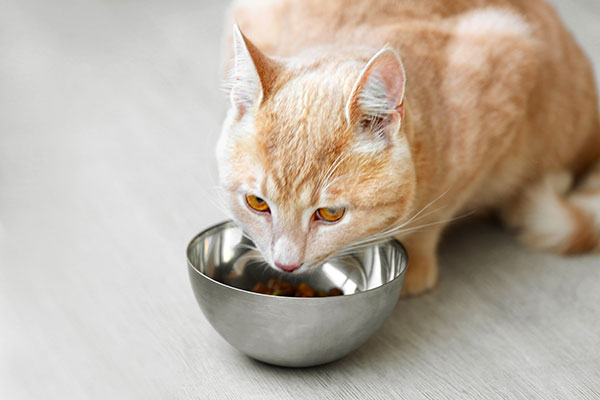
The following are other possible issues with Brazil nuts for cats;
1. Selenium Toxicity
We’ve explored various uses of selenium in the body. Although a trace element, selenium is involved in several vital functions. Examples include improving the thyroid gland and boosting the immune system through its antioxidant properties.
However, this mineral is also known to be toxic to cats. The risks of selenium toxicity increase with the portions of Brazil nuts you share with your kitto.
2. Sodium Ion Poisoning
Brazil nuts could also pose risks of sodium poisoning. This is especially true for processed Brazil nuts which are usually oversalted. The immediate symptoms of sodium ion poisoning include gastrointestinal issues like vomiting and diarrhea.
If untreated, the condition can lead to seizures, tremors, and kidney failures. And that’s precisely the reason why cats with kidney disease shouldn’t eat Brazil nuts.
Are Brazil Nuts Toxic To Cats?
So far, we’ve highlighted the health benefits and potential risks of Brazil nuts for cats. But still, you could still be wondering, are Brazil nuts poisonous to cats? And if so, are Brazil nuts bad for cats to eat?
Although we’ve already pointed this out, it doesn’t hurt to repeat that Brazil nuts are not immediately poisonous to cats. These nuts would only become toxic if fed to cats with careless abandon.
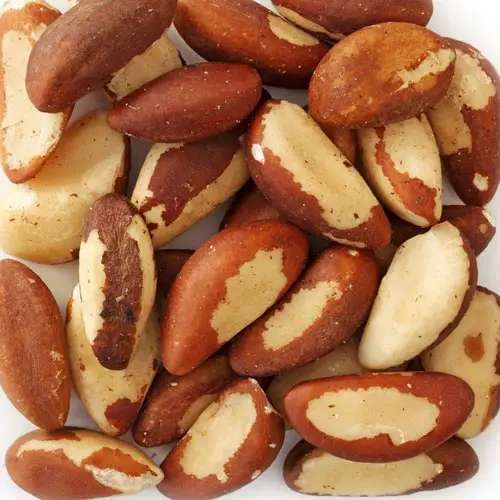
Can A Cat Die From Eating Brazil Nuts?
Feline deaths resulting from eating Brazil nuts are uncommon but possible. Your cat may not drop dead from eating Brazil nuts. But without timely interventions, the side effects caused by these nuts could result in death.
Therefore, it’s important to monitor your cat closely if you suspect that he has consumed Brazil nuts behind your back. Keep your eyes out for symptoms of gastrointestinal distress, such as vomiting and diarrhea.
If you suspect that the portions consumed could be worryingly high, take the animal for a professional checkup immediately.
How Much Brazil Nuts Can A Cat Eat?
There’s no hard-and-fast rule when determining the portions of Brazil nuts to feed your cat. The actual amount depends on factors like the animal’s age, body weight, and whether he has been introduced to these nuts before.
That begs the question, can kittens eat Brazil nuts?
Any foods considered potentially dangerous for cats might harm kittens even more. So, kittens shouldn’t eat Brazil nuts.
A cat’s overall immunity might also determine how much Brazil nuts he should eat or whether he can consume these nuts in the first place.
For instance, pregnant cats and nursing cats can benefit from the high zinc content in Brazil nuts. However, these cats may also suffer more severe side effects of Brazil nuts due to their compromised immunity.
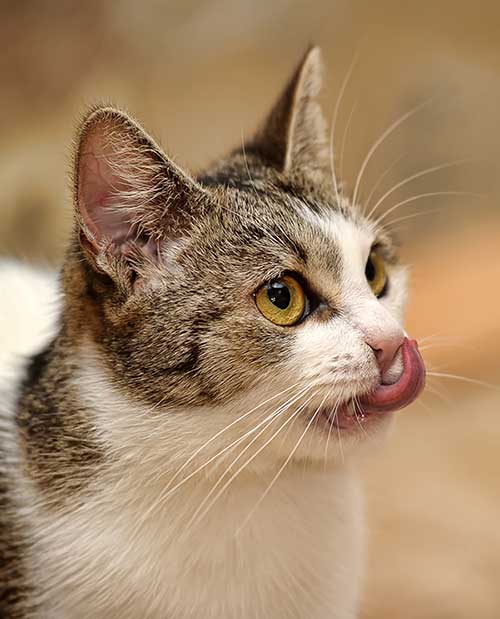
Conclusion
Brazil nuts are safe and even beneficial to cats. But that’s only if fed in small amounts. If you must share these nuts with your feline friend, endeavor to keep the portions low. You might also want to consult your vet before incorporating Brazil nuts into your cat’s diet.
Checkout Our Favorite Cat Products
1. Best Online Course For Cat Parents
Our favorite: The Cat Language Bible (How to Finally Understand And Speak to Your Cat) – A new form of cat to human communication that many cat owners have dreamed about… but few have actually thought possible.
2. Best Immune Support For Cats
Our favorite: Tomlyn Immune Support – Best Supplement for Cats and Kittens.
3. Best Cat Treats
Our favorites: LIFE ESSENTIALS All Natural Freeze Dried Chicken And Sheba Meaty Tender Sticks – Both are Great.

